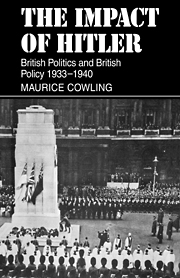Book contents
- Frontmatter
- Contents
- Preface
- Dedication
- Introduction
- PROLOGUE: THE UNFOLDING OF THE PROBLEM
- PART I THE NEW DEPARTURE
- The failure of the League of Nations
- Chamberlain and Eden
- Chamberlain and Hitler
- PART II THE OPPOSITION
- PART III THE EFFECT
- PART IV THE POLITICS OF EASY VICTORY
- Conclusion
- Appendix: the actors
- Bibliography
- Notes
- Index
Chamberlain and Hitler
Published online by Cambridge University Press: 19 October 2009
- Frontmatter
- Contents
- Preface
- Dedication
- Introduction
- PROLOGUE: THE UNFOLDING OF THE PROBLEM
- PART I THE NEW DEPARTURE
- The failure of the League of Nations
- Chamberlain and Eden
- Chamberlain and Hitler
- PART II THE OPPOSITION
- PART III THE EFFECT
- PART IV THE POLITICS OF EASY VICTORY
- Conclusion
- Appendix: the actors
- Bibliography
- Notes
- Index
Summary
‘Czechoslovakian rule in the Sudeten areas for the last twenty years has been marked by tactlessness, intolerance and discrimination’.
Runciman to Chamberlain, September 21 1938 PREM 1/266A‘Neville annoys me by mouthing the arguments of complete pacifism while piling up armaments’.
Attlee to Tom Attlee, February 22 1939‘The principal trouble, of course, remains that we cannot possibly tell… what is going on inside the brains of the one man who matters’.
Halifax to Runciman, September 6 1938, FO 800/309Chamberlain did not try to get rid of Eden and Cranborne, but he felt a great sense of relief at their going. Now that they had gone, the Foreign Office could be run as he wanted it run, secure in the knowledge that Halifax and Butler were enthusiastic proponents of his own point of view who would be less sensitive to Opposition opinion and more willing to take the steps needed ‘to avoid another Great War’. In particular they would help him to rid himself of ‘Collective Security’ of which Eden had been the symbol and Chamberlain's attack on which was thought of by those who heard it in the House of Commons to be ‘a scrapping of the ideas which had been built up since the war’ and a reversion to ‘good old Tory doctrines’.
In this, those who heard him were mistaken. In preferring ‘national strength’ to an ‘international police force’ (which previously he had wanted) Chamberlain took a politician's view of Tory opinion.
- Type
- Chapter
- Information
- The Impact of HitlerBritish Politics and British Policy 1933-1940, pp. 177 - 206Publisher: Cambridge University PressPrint publication year: 1975



